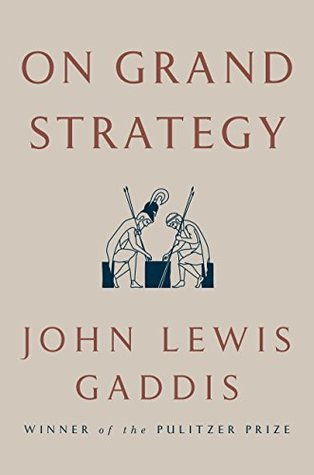More on this book
Community
Kindle Notes & Highlights
leverage: small maneuvers that have big consequences.
That’s where proportionality—the simultaneous comprehension of contradictions76—comes from.
Theory versus practice. Training versus improvisation. Planning versus friction. Force versus policy. Situations versus sketches. Specialization versus generalization. Action versus inaction. Victory versus defeat. Love versus hate. Life versus death. Leading from within clouds versus keeping the ground in view. But no “versus” whatever between art and science. It’s not too much to suggest, therefore, that Clausewitz and Tolstoy together are, in the amplitude, imagination, and honesty with which they approached these great issues, the grandest of strategists.
But Lincoln seems rarely to have regretted his appearance, taking refuge instead in self-deprecation while reserving, for infrequent use, his intimidating strength. Having found it impossible not to be noticed, he decided early on that he might as well be liked.12 So he perfected performance: no one used humor more readily, more aptly, or with less recycling.
it was said of Lincoln that he could “make a cat laugh.”
Within five years, though, Lincoln had embraced a cause, acquired a compass, and set a course.
War was, then, for Lincoln—despite his never having seen this sentence—“an act of force to compel our enemy to do our will.”
Lincoln had to hold his truncated Union together in the face of the sacrifices it would now have to make. That meant retaining the allegiance of Missouri, Kentucky, Maryland, and Delaware, four loyal states where slavery was legal. Lose them, the president acknowledged, and “[w]e would as well consent to separation at once, including the surrender of this capitol.” Or, as he’s said to have added: he “wanted God on his side, but he must have Kentucky.”
“the political object is the goal, war is the means of reaching it, and means can never be considered in isolation from their purpose.”71
“Somehow he managed,” Lincoln’s most thorough modern biographer has concluded, “to be strong-willed without being willful, righteous without being self-righteous, and moral without being moralistic,” thus yielding a “psychological maturity unmatched in the history of American public life.”
Scale sets the ranges within which experience accrues. If, in evolution, edges of chaos reward adaptation; if, in history, adaptation fortifies resilience; and if, in individuals, resilience accommodates unknowns more readily than rigidity, then it stands to reason that a gradual expansion of edges better equips leaders for the unexpected than those that shock, leaving little time to adapt, or those inherited, which breed entitlement and arrogance, its companion.
No expectations lured Lincoln apart from those he set for himself: he started small, rose slowly, and only when ready reached for the top. His ambitions grew as his opportunities expanded, but he kept both within his circumstances. He sought to be underestimated.
Space is where expectations and circumstances intersect.
Finally, then, time. Lincoln kept it on his side: he knew how to wait, when to act, and where to seek reassurance.
Tolstoy suggests, in the last pages of War and Peace, that the interdependence of time, space, and scale simultaneously reflects choice and necessity:
like Mikhail Gorbachev almost a century later, Salisbury set out to deprive an enemy of its enemy.12
“It is a terrible thing,” Roosevelt once admitted, “to look over your shoulder when you are trying to lead—and to find no one there.”94
it was Roosevelt, more than anyone else, who rescued democracy and capitalism—not
He brought two great wars fought on opposite sides of the earth to almost simultaneous victories at a cost in American lives of less than 2 percent of the total for all the participants in those wars.106
His country emerged from them with half the world’s manufacturing capability, two-thirds of its gold reserves, three-fourths of its invested capital, its largest navy and air force, and its first atomic bombs.107
There were, to be sure, pacts with devils in all of these: strategies, like politics, are never pure. But as historians Hal Brands and Patrick Porter have pointed out, “If this wasn’t a suc...
This highlight has been truncated due to consecutive passage length restrictions.
“Any complex activity,” Clausewitz writes, “if it is to be carried on with any degree of virtuosity, calls for appropriate gifts of intellect and temperament. If they are outstanding and reveal themselves in exceptional achievements, their possessor is called a ‘genius.’”39 I take this to mean continuing adjustments of “intellect”—which sets courses—to “temperament”—which determines how they’re pursued.
Temperament functions similarly, I think, in strategy. It’s not a compass—that’s intellect. But it is a gyroscope: an inner ear complementing Clausewitz’s “inward eye.” Like poles on tightropes, temperament makes the difference between slips and safe arrivals.
foxes adapted more easily to rapid changes, but hedgehogs thrived in stable times.41
Which circles back to Tetlock’s view of “good judgment” as a “balancing act” that requires “rethinking core assumptions” while “preserving our existing worldview.”42 Or, in simpler terms, but at all altitudes, applying common sense.
Proportionality comes from what grand strategy is: the alignment of potentially infinite aspirations with necessarily limited capabilities.
And it’s what Sun Tzu, with uncharacteristic gentleness, acknowledged: that “while an angered man may again be happy, and a resentful man again be pleased, a state that has perished cannot be restored, nor can the dead be brought back to life.”48


